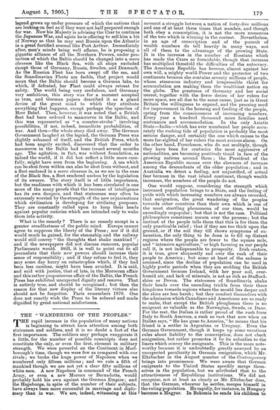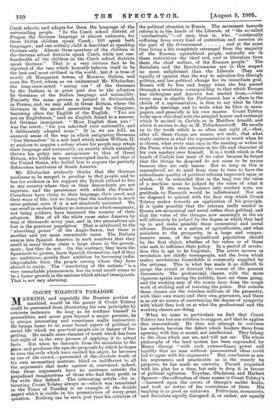THE "WANDERING OF THE PEOPLES." moment a struggle between a
nation of forty-five millions and one of at least three times that number, and though both obey a conscription, it is not the more numerous of the two which is winning in the contest. Nevertheless, in an age of conscription and of the pursuit of wealth numbers do tell heavily in many ways, not all of them to the advantage of the growing State. It is the increase in the number of Russians which has made the Czars so formidable, though that increase has multiplied threefold the difficulties of the autocracy. The American Republic has become, almost against her own will, a mighty world-Power and the protector of two continents because she contains seventy millions of people, whose strenuous industry and irrepressible thirst for accumulation are making them the wealthiest nation on the globe. The greatness of Gennany and her social unrest, together with the fierce desire of her rulers for more space, are all due to the same cause, just as in Great Britain the willingness to expand, and the pressing need for improvement in the housing and feeding of the people, spring from the consciousness of increasing numbers. Every year a hundred thousand more families need sustenance and accommodation. In the only Asiatic State—India—which has ever numbered her people accu- rately the rushing tide of population is probably the most serious danger, and certainly the one which causes to the more far-sighted of her rulers the most serious alarm. On the other hand, Frenchmen, who do not multiply, though they have been for centuries the most aggressive of nationalities, are becoming positively timid in face of the growing nations around them ; the President of the American Republic moans over the slowness of increase among the descendants of the older population ; and in Australia we detect a feeling, not unjustified, of actual fear because in the vast island continent, though wealth increases, the numbers of the people do not.
One would suppose, considering the strength which increased population brings to a State, and the feeling of pride with which increasing numbers are always recorded, that emigration, the great wandering of the peoples towards other countries than their own which is one of the most startling phenomena of our time, would be exceedingly unpopular; but that is not the case. Political philosophers sometimes mourn over the process ; but the instinct of the people tells them that this is for them the only practicable relief ; that if they are too thick upon the ground, or if the soil they till shows symptoms of ex- haustion, the only thing to be done is to fill up distant regions where the people are fewer to the square mile, and "intensive agriculture," or high farming as our people call it, is not indispensable to prosperity. Irish orators, it is true, grow eloquently sad over the rush of their people to America ; but some at least of the sadness is assumed, since the decline of population can be used in highly poetic periods when they are scolding the British Government because Ireland, with her poor soil, over- humid air, and lack of minerals, is not as rich as Stafford- shire or Devon. The statesmen of Scandinavia shake their heads over the unending trickle from their three kingdoms towards regions where the mould lies deeper and the skies are less harsh ; but they comfort themselves with the admission which Canadians and Americans are so ready to make, that except the British ploughman there is no emigrant so valuable as the Norwegian, Swede, or Dane. For the rest, the Italian is rather proud of the rush from Italy to South America, a rush so vast that now when an Italian says, "He has gone to America," he means that his friend is a settler in Argentina or Uruguay. Even the German Government, though it keeps up some vexatious rules about liability to the conscription, does not check emigration, but rather promotes it by its subsidies to the liners which convey the emigrants. This is the more note- worthy because it is undoubtedly greatly annoyed by an unexpected peculiarity in German emigration, which Mr. Eltzbacher in the August number of the Contemporary brings into prominence. We were aware that German emigrants to the UniLed States speedily merge them- selves in the population, but we attributed that to the attractiveness of Republican institutions. We did not recognise, not at least as clearly as Mr. Eltzbacher does, that the German, wherever he settles, merges himself in the ruling population. He rapidly, for instance, in Hungary becomes a, Magyar. In Bohemia he sends his children to gzech schools, and adopts for them the language of the surrounding people. In the Czech school district of Prague the German language is almost unknown, for there 16,644 children speak Czech ; 163 speak both languages ; and one solitary child is described as speaking German only. Almost three-quarters of the children in the German school districts speak Czech, while not one- hundredth of the children in the Czech school districts speak German." That is a very curious fact to be reported of the race which honestly believes itself to be the best and most civilised in the world ; but it is true of nearly all Hungarian towns, of Moravia, Galicia, and even the Tyrol, where, as we understand Mr. Eltzbacher, the long-since-noted "eating out" of the Germans by the Italians is in great part due to the adoption by Germans of the Italian language and nationality. Precisely the same process is noticed in Switzerland, in France, and, we may add, in Great Britain, where the Germans in the second generation tend to disappear, becoming often the English of the English. "You are not an Englishman," said an English friend to a success- ful German immigrant. "More English than you ! " was the retort; "for you inherited your nationality, and I deliberately adopted mine." It is, we are told, an annoyed sense of the way in which emigrating Germans "lose themselves" in a new land which makes William II. so anxious to acquire a colony where his people may retain their language and nationality, an anxiety which naturally throws his policy into antagonism to that of Great Britain, who holds so many unoccupied lands, and that of the United States, who forbid him to acquire the partially defenceless territories of South America.
Mr. Eltzbacher evidently thinks that the German readiness to be merged is peculiar to that people, and he has for evidence in his support the British refusal to live in any country where they or their descendants are not supreme, and the persistence with which the French- Canadians have clung to their language, their creed, and their ways of life; but we fancy that the readiness is much more general, even if it is not absolutely universal. We can recall in modern history no instance in which emigrants, not being soldiers, have mastered the country of their adoption. Men of all the white races enter America by tens of thousands every year, and in two generations are lost in the previous population. That is attributed to the "absorbing power" of the Anglo-Saxon, but there is another and yet more remarkable cause. The Italians swarm into Spanish America in such numbers that they could in many States claim a large share in the govern- ment; but they do not. On the contrary, they leave the Spaniards to govern, learn Spanish themselves, and if they are ambitious, gratify their ambition by becoming indis- tinguishable from the people among whom they have elected* to reside. The "wandering of the nations" is a very remarkable phenomenon, but its total result seems to be a faster growth in the nations which attract immigrants. That is not very alarming.







































 Previous page
Previous page